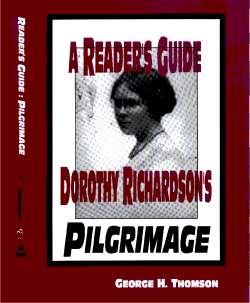Over the years, Pilgrimage (1915-1967) has been viewed as early Modernism's great documentary novel, as daring experimental fiction, as spiritual autobiography and pioneer of cinematographic technique. No matter what critical viewpoint readers use, Pilgrimage's reputation as a demanding text persists. Like James Joyce's Ulysses, Richardson's 2000 intricately woven pages have challenged readers for decades.
She explores a new way of presenting reality in Pilgrimage, one that is immediate rather than retrospective. As the resulting chronicle of events extends itself, however, the larger picture grows puzzling. Scenes change suddenly, characters spring from the long forgotten past, years disappear without a trace.
A Reader's Guide meets these difficulties with a detailed account of the time scheme of the narrative, and a precise chronology of events keyed to the novels by page number for easy reference. Relationships among the principal persons of the story are followed throughout, and all the characters are placed in context in an alphabetically arranged descriptive directory. The book concludes with a select annotated secondary bibliography.
Thomson's practical scholarship bridges the ruptures and absences in Richardson's narrative to help readers master Pilgrimage in its broader outlines, in its structure, time-scheme, and character relations. Kristin Bluemel, author of Experimenting on the Borders of Modernism: Dorothy Richardson's Pilgrimage (University of Georgia, 1996), aptly captures Thomson's achievement:
"A Reader's Guide to Dorothy Richardson's Pilgrimage does more than serve as a long-awaited reference tool; it also reminds us of the way Richardson's luminous multi-volume novel participates, despite or even because of all its difficulties of time, in the ongoing debates about the critical practices and literary priorities of modernity."

$30.00 Cloth 192 pp.
1996 0-944318-10-X Acid-Free Paper
No. 11 in the 1880-1920 British Authors Series
Also an E-Book at Johns Hopkins's Project MUSE
E-Book 978-0-944318-51-5
